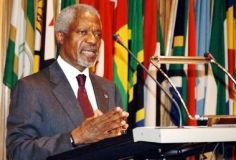World must race against time to save Darfur- Annan
By Tsegaye Tadesse
ADDIS ABABA, May 26 (Reuters) – U.N. Secretary General Kofi Annan urged donors on Thursday to fund a bigger African force to help end bloodshed in Darfur, where experts say hundreds are still dying daily nine months after the mission first deployed.

|
|
UN SG Kofi Annan addresses the African Union meeting in Addis Ababa, Ethiopia May 26, 2005. (Reuters). |
Annan warned rich nations at a pledging conference in neighbouring Ethiopia that they would end up having to finance an “epic relief effort” if more violence made food even scarcer in the vast western region of Sudan, Africa’s largest country.
“We are running a race against time. The rainy season and the ‘hunger gap’ are approaching fast, making our relief operations more difficult,” Annan said in a speech at African Union (AU) headquarters in Addis Ababa.
“If violence and fear prevent the people of Darfur from planting and growing crops next year, then millions will have to be sustained by an epic relief effort which will stretch international capacity to the maximum.”
The 53-nation AU has deployed about 2,300 troops to monitor a shaky ceasefire in Darfur, with international financial backing to pay for the mission, but experts say the force is far too small to patrol an area the size of France.
The AU told donors it needs $724 million to more than triple the force and equip it with attack helicopters, armoured personnel carriers and fuel. It first deployed in August 2004.
Some 180,000 people have died in Darfur through violence, hunger and disease since a conflict broke out in February 2003 after rebels took up arms against the Arab-dominated government.
Khartoum is accused by its opponents of retaliating by arming local Arab militia, who burned down villages and slaughtered and raped civilians.
Annan urged rich nations to fund an expansion of the force “without delay”, saying civilians were still being attacked.
“An expanded African Mission, at full operational capability, will mean the great majority of vulnerable civilians in Darfur will be protected from violence,” he said.
The European Union and 26-nation NATO alliance have agreed to provide air transport and training for the expanded AU force.
MORE TROOPS SEEN NEEDED
But the Crisis Group think tank says Darfur needs as many as 15,000 troops on the ground in the next 60 days and a mandate expanded to allow it to unilaterally protect citizens – at present the Sudan government has responsibility for that task.
And the genocide prevention group Aegis Trust said the AU needed an “absolute minimum” of 25,000 troops in Darfur, where it estimates 500 are dying daily.
Annan said a bigger force would fail without agreement on both sides to pursue peace. He urged the rebels and government to resume AU-mediated talks, which stalled in December.
“Ultimately, it is the supreme obligation of the parties to end the conflict in Darfur,” he said.
AU Commission chairman Alpha Oumar Konare said talks between the rebels and the Sudanese government were expected to resume by June 10 in the Nigerian capital Abuja. “There is no other solution than dialogue,” he told the conference.
Negotiations had been due to resume in Abuja on May 30, but U.N. envoy Jan Pronk said on Wednesday the two rebel groups had delayed the talks and he urged them to get “their act together”.
In Nairobi, Abdel Wahed Mohamed al-Nur, leader of the Darfur rebel Sudan Liberation Army, called on the conference to help bring about the disarming of the Janjaweed Arab militia.
He urged donors to provide “security in Darfur by means of international forces and arrest those accused of war crimes.”
Sudanese First Vice-President Ali Osman Mohamed Taha, speaking at the conference, urged the AU to send a clear message to the rebels to stop attacks on aid workers and civilians.
Annan also appealed for money to fund U.N. humanitarian activities around Sudan, where food distribution by the U.N. World Food Programme (WFP) faces a chronic shortage of funds.
“More than three million will need relief to get through the next few months. We are still 350 million dollars short of what we require to provide that relief,” he said.
